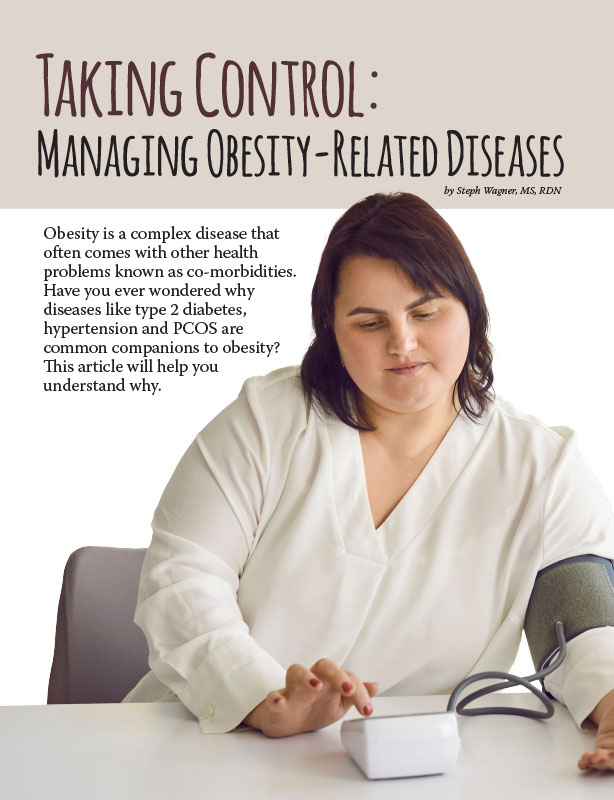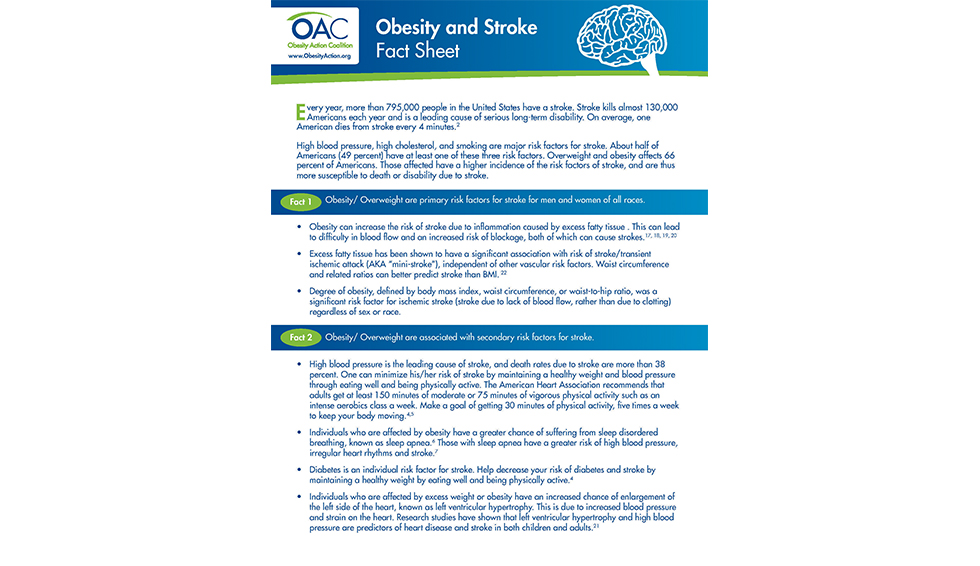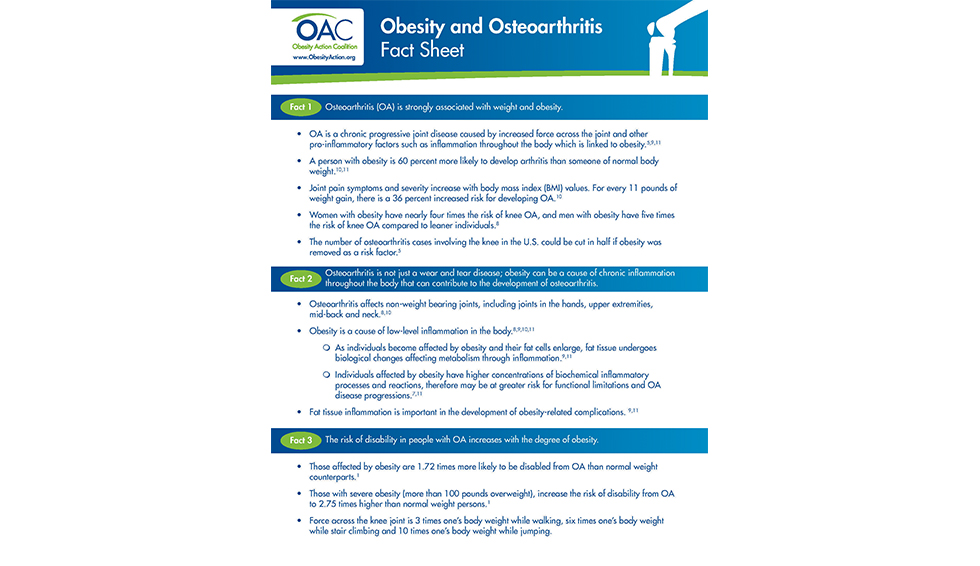Aging, Menopause and Obesity: Navigating Health Challenges


by Katherine H. Saunders, MD, DABOM
Spring 2024
Menopause probably isn’t anyone’s idea of fun. While this natural phase of a woman’s life does mean saying goodbye to periods, it also brings many physical and mental changes that can vary from mildly annoying to downright debilitating.
Hormonal Changes Cause Side Effects.
During perimenopause, which is the transition to menopause, many common side effects such as hot flashes and night sweats occur due to hormonal shifts. These symptoms typically improve and eventually disappear after menopause, which is characterized as not having a period for over a year. However, some issues caused by lower levels of estrogen and progesterone may persist.
Weight Gain is Common.
One of the long-term side effects of menopause is weight gain, which is a hot topic right now. Some studies suggest that weight gain happens as a normal result of getting older rather than menopause itself, and not all women gain weight. Still, menopause brings various changes that can affect weight, like more fat buildup, especially around the belly.
Muscle Mass Decreases.
During menopause, your body burns fewer calories when resting or active, so you exert less energy. These changes in body composition and metabolism can be tough, especially for women who have never had weight issues. For those who already have excess weight, especially women with obesity, these added challenges can raise the risk of weight-related health problems.
Estrogen and Progesterone Levels Drop.
Menopause leads your body to make less estrogen and progesterone. Progesterone loss partly affects weight by making you retain more water, but the drop in estrogen has bigger and longer-lasting effects. For example, losing estrogen can weaken the signals in your brain that tell you when you’re full, increasing the likelihood of binge eating and reducing the calories you burn.
Insulin Resistance Creates a Vicious Cycle.
During menopause, your body may become less sensitive to insulin, which leads to higher blood sugar levels and more fat storage. This starts something of a vicious cycle where more belly fat leads to even more insulin resistance, raising the risk of type 2 diabetes and heart disease, two of the most common and serious weight-related health issues.
Treatment Options Exist.
So, how do we tackle weight gain during menopause? Surprisingly, hormone replacement therapy, a common treatment for many menopause symptoms, doesn’t seem to affect weight much at all. However, there are other ways to help, and weight gain is not inevitable.
You Need a Comprehensive Approach.
Eating right and staying active are the foundations of weight management. But to beat your body’s resistance to weight loss, especially if you have obesity, you need a comprehensive plan. This means getting ongoing support to make lasting lifestyle changes and considering all factors that affect weight, including medical options.
A Sustainable Diet is Important.
Various eating plans can help with insulin resistance, like low-carb and Mediterranean diets. The most important thing is to find a way of eating that you can stick to long-term, one that becomes part of a healthy lifestyle rather than a temporary effort. This means the food must be tasty and satisfying without feeling too strict.
Find an Activity Plan That Works for You.
Physical activity helps fight insulin resistance and supports weight loss. The ideal plan includes both aerobic exercise, which burns calories and improves heart health, and strength training, which builds muscle and reduces fat. Once again, sustainability is crucial. Physical activity should fit your lifestyle and your schedule and be something you enjoy. It doesn’t have to be “traditional” exercise or require going to the gym.
Medications Might Help.
If your weight doesn’t respond to diet and physical activity, and your BMI is over 30 (or over 27 with weight-related health problems), anti-obesity medications could be an option. These medications — such as metformin, liraglutide, phentermine/topiramate, naltrexone/bupropion, semaglutide, and tirzepatide, among others — can counteract the effects of insulin resistance.
When combined with diet and exercise, medications can help overcome some of the hormonal, metabolic, and neurobehavioral ways your body tries to stop you from losing weight. For instance, they can help if you hit a weight plateau or start having strong cravings.
Don’t Be Afraid to Ask for Help.
The bottom line is that gaining weight during menopause is very common, but we don’t talk about it enough. If changing your lifestyle hasn’t worked, don’t be afraid to talk with your primary care provider, gynecologist, or weight management provider (if you have one). They can give you a thorough checkup focused on your weight and make a personalized treatment plan. This plan should address everything causing weight gain and anything stopping you from losing weight. Getting ongoing support from your healthcare team is super important for managing your weight in the long run. And if you feel comfortable, talk to your friends going through menopause — they probably understand what you’re going through and would love to share experiences!
About the Author:
Katherine H. Saunders, MD, DABOM, is a physician entrepreneur and a leading expert in Obesity Medicine. She is at the forefront of delivering effective and compassionate treatment for obesity. Dr. Saunders co-founded Intellihealth, a company that provides software and clinical services to make comprehensive medical obesity treatment more accessible. She practices at Flyte Medical, which is affiliated with Intellihealth’s clinical services, and she serves on the faculty at Weill Cornell Medicine. Dr. Saunders earned her undergraduate degree Phi Beta Kappa/Summa Cum Laude from Dartmouth College and her medical degree from Weill Cornell Medical College, where she was inducted into the Alpha Omega Alpha Honor Medical Society. She completed her residency in Internal Medicine at New York-Presbyterian Hospital, and she was the first clinical fellow in Obesity Medicine at Weill Cornell Medicine.
by Steph Wagner, MS, RDN Spring 2024 Obesity is a complex disease that often comes with other…
Read ArticleEvery year, more than 795,000 people in the United States have a stroke. Stroke kills almost 130,000…
Read MoreOsteoarthritis (OA) is strongly associated with weight and obesity. OA is a chronic progressive joint disease caused…
Read More









